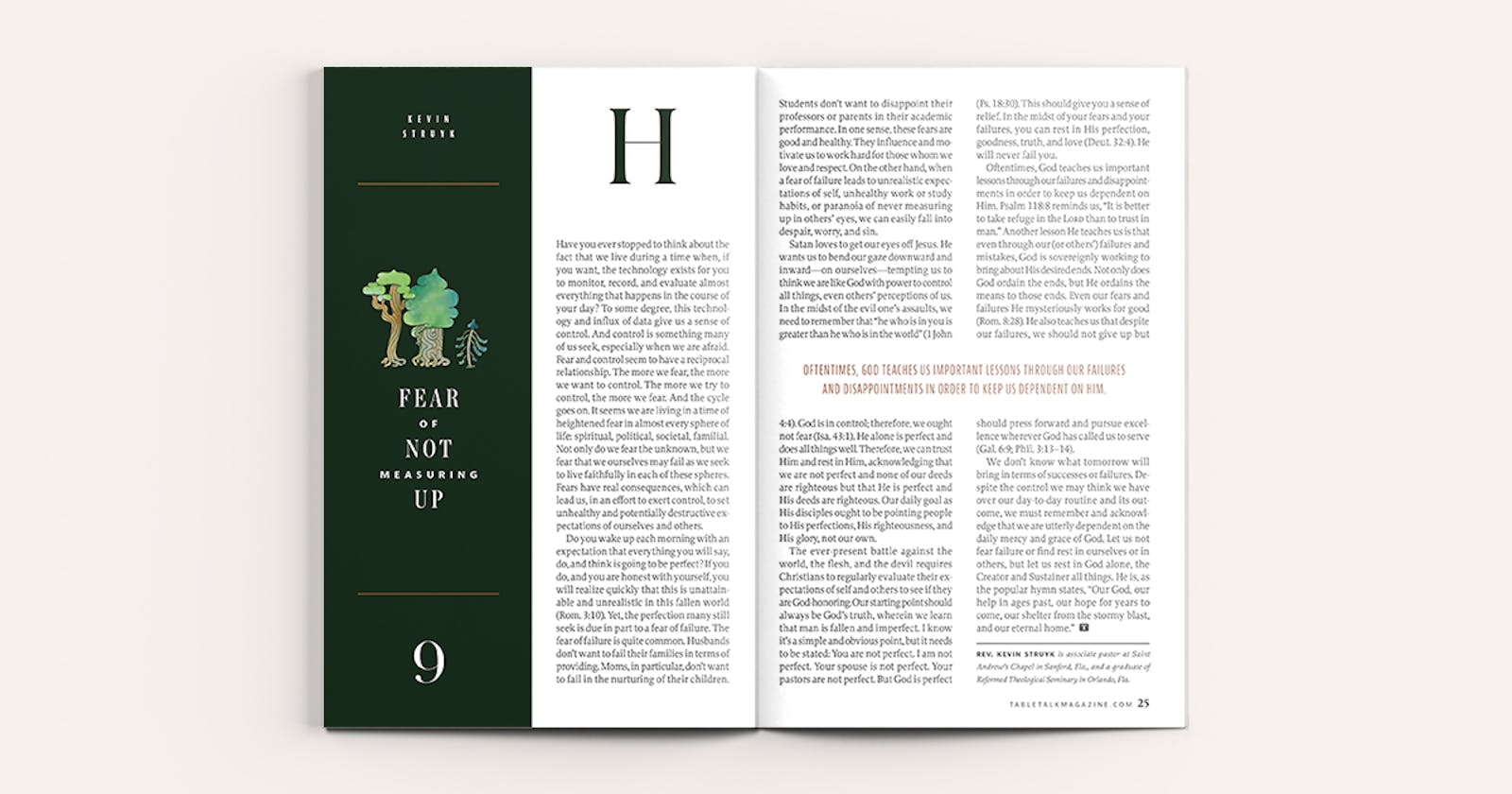
Request your free, three-month trial to Tabletalk magazine. You’ll receive the print issue monthly and gain immediate digital access to decades of archives. This trial is risk-free. No credit card required.
Try Tabletalk NowAlready receive Tabletalk magazine every month?
Verify your email address to gain unlimited access.
Have you ever stopped to think about the fact that we live during a time when, if you want, the technology exists for you to monitor, record, and evaluate almost everything that happens in the course of your day? To some degree, this technology and influx of data give us a sense of control. And control is something many of us seek, especially when we are afraid. Fear and control seem to have a reciprocal relationship. The more we fear, the more we want to control. The more we try to control, the more we fear. And the cycle goes on. It seems we are living in a time of heightened fear in almost every sphere of life: spiritual, political, societal, familial. Not only do we fear the unknown, but we fear that we ourselves may fail as we seek to live faithfully in each of these spheres. Fears have real consequences, which can lead us, in an effort to exert control, to set unhealthy and potentially destructive expectations of ourselves and others.
Do you wake up each morning with an expectation that everything you will say, do, and think is going to be perfect? If you do, and you are honest with yourself, you will realize quickly that this is unattainable and unrealistic in this fallen world (Rom. 3:10). Yet, the perfection many still seek is due in part to a fear of failure. The fear of failure is quite common. Husbands don’t want to fail their families in terms of providing. Moms, in particular, don’t want to fail in the nurturing of their children. Students don’t want to disappoint their professors or parents in their academic performance. In one sense, these fears are good and healthy. They influence and motivate us to work hard for those whom we love and respect. On the other hand, when a fear of failure leads to unrealistic expectations of self, unhealthy work or study habits, or paranoia of never measuring up in others’ eyes, we can easily fall into despair, worry, and sin.
Satan loves to get our eyes off Jesus. He wants us to bend our gaze downward and inward––on ourselves––tempting us to think we are like God with power to control all things, even others’ perceptions of us. In the midst of the evil one’s assaults, we need to remember that “he who is in you is greater than he who is in the world” (1 John 4:4). God is in control; therefore, we ought not fear (Isa. 43:1). He alone is perfect and does all things well. Therefore, we can trust Him and rest in Him, acknowledging that we are not perfect and none of our deeds are righteous but that He is perfect and His deeds are righteous. Our daily goal as His disciples ought to be pointing people to His perfections, His righteousness, and His glory, not our own.
The ever-present battle against the world, the flesh, and the devil requires Christians to regularly evaluate their expectations of self and others to see if they are God-honoring. Our starting point should always be God’s truth, wherein we learn that man is fallen and imperfect. I know it’s a simple and obvious point, but it needs to be stated: You are not perfect. I am not perfect. Your spouse is not perfect. Your pastors are not perfect. But God is perfect (Ps. 18:30). This should give you a sense of relief. In the midst of your fears and your failures, you can rest in His perfection, goodness, truth, and love (Deut. 32:4). He will never fail you.

Oftentimes, God teaches us important lessons through our failures and disappointments in order to keep us dependent on Him. Psalm 118:8 reminds us, “It is better to take refuge in the LORD than to trust in man.” Another lesson He teaches us is that even through our (or others’) failures and mistakes, God is sovereignly working to bring about His desired ends. Not only does God ordain the ends, but He ordains the means to those ends. Even our fears and failures He mysteriously works for good (Rom. 8:28). He also teaches us that despite our failures, we should not give up but should press forward and pursue excellence wherever God has called us to serve (Gal. 6:9; Phil. 3:13–14).
We don’t know what tomorrow will bring in terms of successes or failures. Despite the control we may think we have over our day-to-day routine and its outcome, we must remember and acknowledge that we are utterly dependent on the daily mercy and grace of God. Let us not fear failure or find rest in ourselves or in others, but let us rest in God alone, the Creator and Sustainer all things. He is, as the popular hymn states, “Our God, our help in ages past, our hope for years to come, our shelter from the stormy blast, and our eternal home.”
